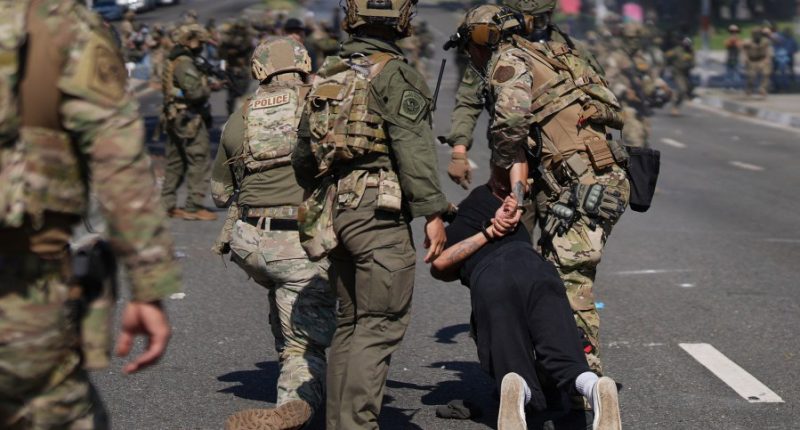Share this @internewscast.com

(NEXSTAR) – Arrests by Immigration and Customs Enforcement (ICE) have rapidly escalated under President Donald Trump.
The White House announced on Monday that since Trump assumed office, ICE officers have detained over 100,000 individuals in under five months. This figure approaches the total of 113,000 arrests made during the entire fiscal year of 2024.
Civil rights groups emphasize that immigrants and others should be aware of their legal rights if they face encounters with ICE officers or become involved in an ICE operation.
What are my rights if I’m questioned by ICE?
The American Civil Liberties Union (ACLU) says if you’re stopped by ICE officers, you have the right to remain silent.
The ACLU informs people, “You do not have to respond to inquiries about your birthplace, your citizenship status, or your method of entering the country,” but they note that different regulations apply at borders and airports.
You also don’t need to consent to a search of your belongings. (You may be patted down if officers suspect you could have a weapon, the ACLU says.)
ACLU’s Northern California chapter gives these quick tips to keep in mind:
- Don’t automatically open your door to ICE. Ask first if officers have a search warrant – not just an arrest warrant. Without one, and without your permission, they can’t enter your home. They can pass a warrant under the door if you don’t want to open.
- Look at the warrant closely. “Only a court/judge warrant grants ICE permission to enter your premises. One issued by DHS or ICE and signed by a DHS or ICE employee does not,” ACLU of Northern California writes. The National Immigrant Justice Center has posted examples of different types of warrants online, so you know what to look for.
- If agents force entry, you can say, “I do not consent to your entry,” but the ACLU advises you do not resist them physically.
- Ask to speak to a lawyer and be careful what you sign. “ICE might ask you to sign forms agreeing to be deported without first seeing a judge.”
- If officers don’t speak your language, ask for an interpreter.
- Document whatever you can: note down badge numbers, take photos and/or videos, and make note if ICE interferes with your ability to take photos or videos.
What are my rights if I’m detained by ICE?
You can reiterate your desire to remain silent and speak to a lawyer. While the government doesn’t have to provide you with a lawyer in these cases, you can ask for a list of free or low-cost legal representation.
“Don’t say anything, sign anything, or make any decisions without a lawyer,” the ACLU advises.
You also have the right to a local phone call if you are detained.
What can I do to reduce the risk to my safety in ICE encounters?
The ACLU advises people to stay calm, don’t resist and don’t give officers fake documents. People can prepare by memorizing the phone numbers of loved ones and their lawyer, and make emergency contingency plans if they have children that need to be cared for or medications they need to take.
Why are people protesting in Los Angeles?
Monday was the fourth day of demonstrations against Trump’s immigration crackdown in the Los Angeles region.
The protests started after federal agents arrested immigrants in LA’s fashion district, in a Home Depot parking lot and at several other locations on Friday. The next day, they were staging at a Department of Homeland Security office near another Home Depot in Paramount, which drew out protesters who suspected another raid. Federal authorities later said there was no enforcement activity at that Home Depot.
Tensions escalated Sunday into Monday after Trump’s extraordinary deployment of the National Guard, as demonstrators blocked off a major freeway and set self-driving cars on fire as law enforcement used tear gas, rubber bullets, and flash bangs to control the crowd.
On Monday, hundreds of U.S. Marines were also being mobilized to Los Angeles. Gov. Gavin Newsom responded to the move on social media, saying, “U.S. Marines have served honorably across multiple wars in defense of democracy. They are heroes. They shouldn’t be deployed on American soil, facing their own countrymen to fulfill the deranged fantasy of a dictatorial President. This is un-American.”
California officials have now sued to roll back the National Guard deployment, saying the president trampled on the state’s sovereignty.
The Associated Press contributed to this report.










